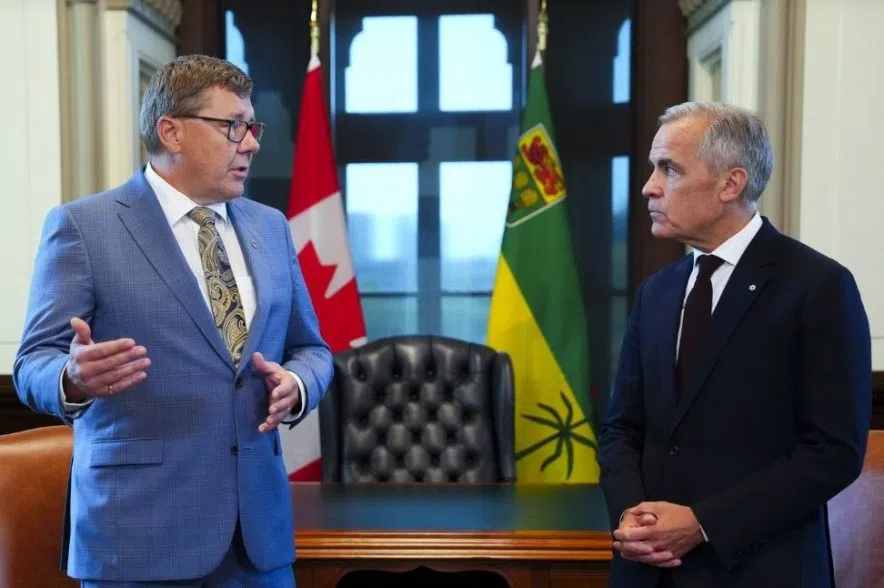OTTAWA — Saskatchewan Premier Scott Moe, back from China amid a major trade dispute on canola, met Tuesday with Prime Minister Mark Carney to discuss ways to mend fences with both China and the United States.
“We had a good meeting,” Moe told reporters after the meeting in Carney’s office.
“This is another step in finding our way through what is a pretty difficult time for a significant Canadian industry.”
Read more:
- Trade mission to China ‘more positive than expected’ says Sask. Premier
- RCMP release victim’s name from Weyburn highway shooting
- Temporary housing coming for Creighton, Denare Beach residents who lost homes in Wolf Fire
Moe said China is interested in moving forward and recalibrating its trading relationship with Canada.
“I think that will be found through dialogue, not laying down markers publicly in the lead-up to that dialogue,” he said. “I’m confident that the federal government is going to build on some of that work.”
Carney thanked the premier for leading the trip to China last week with the prime minister’s parliamentary secretary, Kody Blois.
“At the core is working for the people of Saskatchewan, workers and their families, and through that the people of Canada,” Carney told reporters.
“The premier is a proud Canadian and he is committed to our country. (His) contribution at the tables have been essential to getting us together and moving forward.”
China has imposed a 76 per cent tariff on Canadian canola seed, widely seen as a response to Canada’s 100 per cent tariff on Chinese electric vehicles.
Beijing has also imposed duties of 100 per cent on Canadian canola oil, meal and peas, along with other levies on pork and some seafood products in response to Canada’s 25 per cent tariffs on Chinese steel and aluminum.
Canola, one of Canada’s and Saskatchewan’s most valuable crops, is said to have contributed $43 billion to Canada’s economy last year and employed 200,000 people.
Last week, Moe and Blois met with Chinese officials who oversee the agency responsible for imposing the tariffs. They also met with Li Chenggang, the international trade negotiator with China’s Ministry of Commerce, and other industry officials.
The premier has said removing Canada’s EV tariff on China would not be a simple fix, as Canada also has to consider its trading relationship with the United States.
Ottawa had imposed the EV tariff on Beijing in lockstep with then-U.S. president Joe Biden, who also slapped tariffs on Chinese EVs. Ottawa has justified its levies on Chinese EVs by arguing they protect planned investments at home.
“It’s a delicate dance,” Moe said of dealing with both China and the United States. “Decisions that you make here will have an indirect impact on your relationship with another country.”
Moe also urged Ottawa to loosen regulations to help spur development and economic activity.
“This is a new space for the government of Saskatchewan to actually work alongside the federal government on determining our own destiny within our borders but then also working alongside one another as we increase our international presence,” he said.
This report by The Canadian Press was first published Sept. 16, 2025.
— By Jeremy Simes in Regina
The Canadian Press











